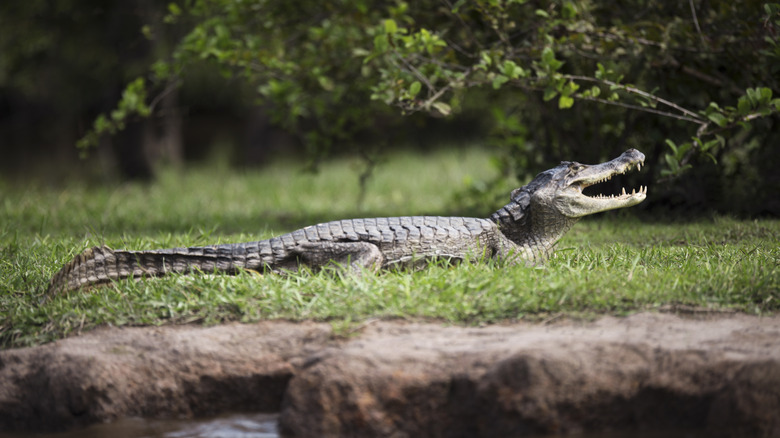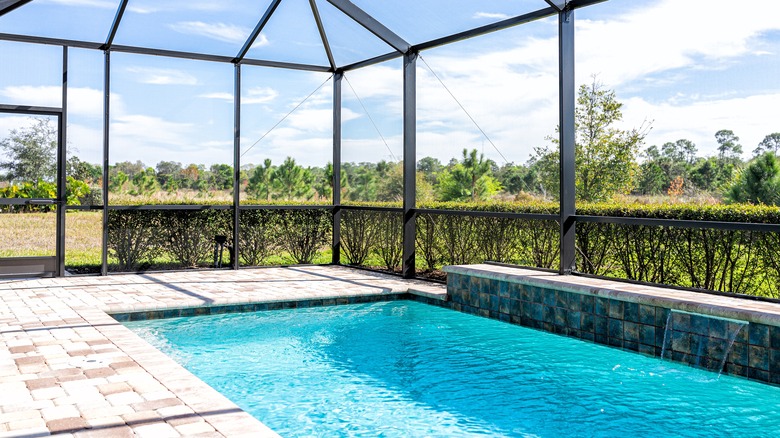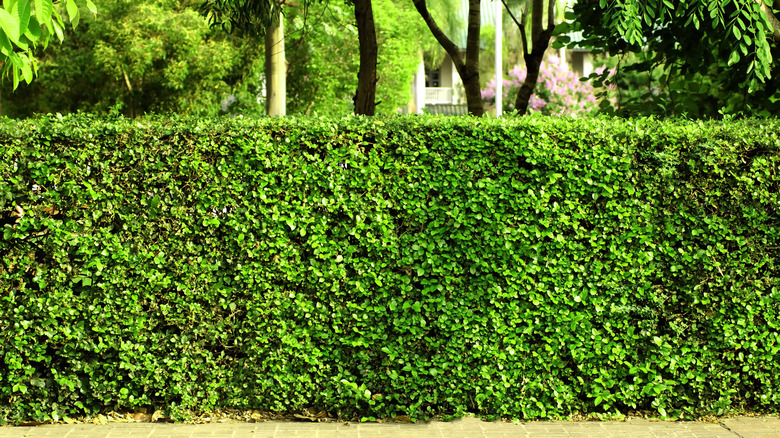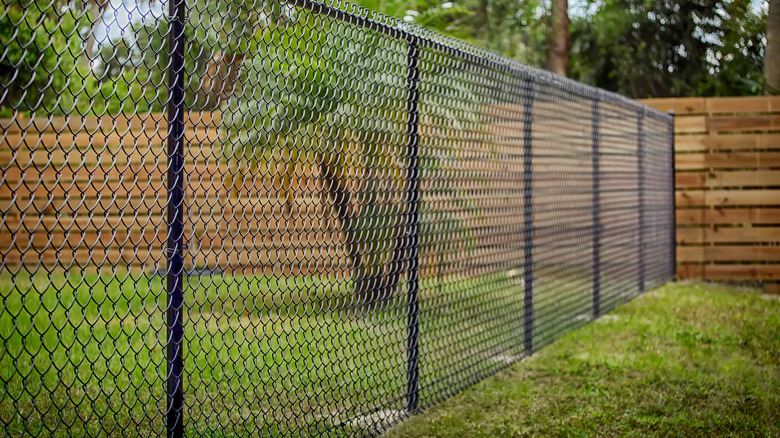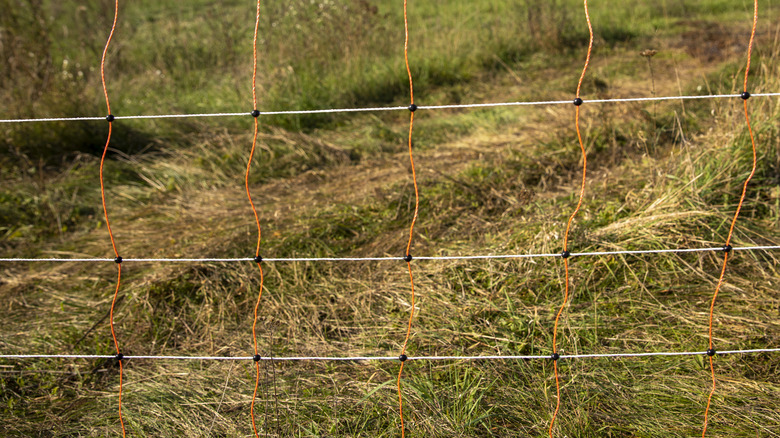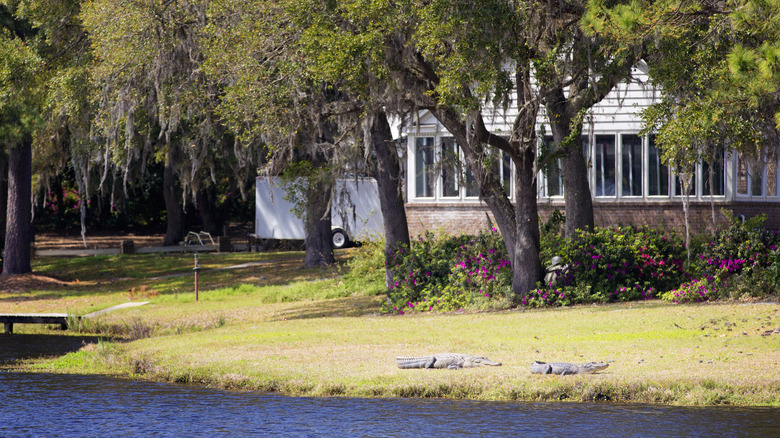Humane Ways To Keep Alligators Off Your Property
Out of all the critters that might crawl, scuttle, or slither onto your property, an alligator is one of the most fearsome. Reptilian by nature and fearsome by design, these sharp-toothed lizards can be found in the rivers, swamps, and lakes of U.S. states such as Florida, Louisiana, North Carolina, and eastern Texas. If you live near gator territory, there's a good chance one of these prehistoric throwbacks might at some point come wandering out of the wilderness and onto the grounds of your home. It's not a pleasant experience or possibility, but rest assured, there are many humane steps you can take to deal with the problem.
Being confronted with the sharp-toothed snout and armored body of an apex predator on your lawn or in your pool is a sight enough to make the most steely-nerved amongst us choke on their cappuccino. However, although a state such as Florida, described as the home of the alligator, suffers from its fair share of attacks, the chances of becoming a victim of an unprovoked attack are one in 3.1 million (via Florida Fish and Wildlife Conservation Commission). However, no one wants these cold-blooded beasts turning up at their gate unannounced, particularly if you have pets or small children. Here's how to gator-proof your property and keep these protected species out humanely.
Keep your yard clear of things that attract alligators
Alligators tend to leave their natural habitats and roam onto our properties for various reasons. The males of the species often wander far and wide looking for a mate. Meanwhile, the younger, smaller gators, who are often at risk of being eaten by their elders, seek refuge in new territories. As humans encroach increasingly upon their traditional habitat, more and more of them are going to come knocking. Particularly if there are things in your yard they find attractive, such as unsecured garbage and other potential food sources.
If there's one thing alligators like to do and do well, it's eat! They're not exactly what you call culinary connoisseurs and pretty much anything is on their menu. They're carnivores who also have a passion for fruit. So, if there's any leftover food in your yard or something in the unsecured trash that they can smell, they may just decide to pay you a visit. Ensure you dispose of that half-eaten burger and keep the barbecue grill safely stashed away in the garage when not in use. A firm critter-proof and odor-proof lid on the food waste bin will also remove temptation from their path. Additionally, keep your yard free of any clutter, like playhouses or unused kennels, that might be viewed as a temporary shelter for an opportunistic gator.
Protect your pool
An alligator's natural environment is the water. The trouble is they don't differentiate between a swamp, a pond, or a backyard pool. That's why it's so important to secure your pool properly if you want to keep these leathery water lovers off your property. Draining your pool isn't a year-round option, and although polyethylene covers work well at keeping snakes out, they are pretty hopeless against 2,205 pounds of determined lizard. The more sturdy covers made of reinforced vinyl or mesh are a good option for long-term use during the winter, but they are not tailored for every day use and therefore not a reliable solution in the summer months. Additionally, they are still not guaranteed to withhold the weight of a full-grown gator.
If your finances dictate, and you are in the process of building a pool, an automatic cover will prove invaluable, but it's not practical to add to an existing pool and can be quite costly. Your best bet is a pool screen enclosure. A professionally installed enclosure will keep gators and a host of other pests from using your pool as a free-for-all. A 5-foot barrier made of glass or mesh surrounding the pool on all sides is a perfect deterrent. It should be sturdy and stable enough to dissuade the most tenacious reptile. If you want to leave nothing to chance you could also invest in a pool alarm. They work wonders at keeping children safe from harm and will let you know when a gator has entered your pool so you can safely plan your next step.
Create natural barriers that are tricky for them to cross
Of course, if you can prevent an alligator from reaching your pool or pond in the first place, then the battle is half-won. Turn to Mother Nature for a little helping hand and create a barrier of harsh and unforgiving terrain at the edges of your yard. A first-line defense of dense vegetation in the form of shrubs or a hedge could serve as a natural deterrent to a gator on the prowl.
Dean Harrigal, a wildlife biologist with the South Carolina Department of Natural Resources (SCDNR) told The Island Packet, "Heavy vegetation barriers in some cases, placed at the edge of a pond, may deter some alligators from crawling up and sunning on the edge of the pond." However, there is a catch and it's a big one. Although a barrier of greenery might be effective at keeping out a lazy lizard, it won't deter snakes. All the isolation and cover that the plants afford are quite attractive to anything that slithers and hisses a lot. Herpetologist for the SCDNR Will Dillman added, "As far as snakes go, seeing things is always better, and if you start putting things up that may block your vision it's going to impair your ability to actually see them." So, if you go down the route of creating a natural alligator barrier, be sure to weigh up the pros and cons first.
A fence is your best defense
If you want to let something in, you install a door, if you want to keep something out, you build a fence. It's not rocket science, but time and tradition have proved it devastatingly effective at keeping trespassers out, including the leather-skinned and snouty kind. Yet, if you're serious about putting up a barrier between you and the citizens of the swamp, you need to be thorough. Alligators can dig, so ensure about 2 feet of the fence is buried beneath the ground.
However, don't make the common mistake of thinking that alligators can't climb fences. A quick Google search will soon throw up plenty of videos and images of them scaling chain link fences like Spiderman. So, if your fence is chain link, it should stand at a minimum of 5 feet tall and have a 45-degree angle overhang to deter the gators that like to climb. A top covering of barbed wire is also a good last line of defense. A tall aluminum or wooden fence might block out the light and views and be a lot more costly and time-consuming to install. However, they are more effective. Gators cannot find a good grip on their smooth surface and are unable to climb without having anything for their reptilian claws to grab onto.
Electric fences are also an option, but are they risky?
If you feel a standard fence alone is not enough to help you sleep soundly at night without gators breaking into your yard (and dreams), you could always do what Bob Dylan did in 1965 and go electric! According to the experts, a single-strand fence cackling with electric current and raised a few inches from ground level is one of the best options money can buy. Wildlife biologist Dean Harrigal told The Island Packet, "We routinely use electric fences to keep domestic animals in and wildlife out. An electric fence properly run and a couple of inches from the ground could be a reasonably good deterrent to gators in certain situations."
Compared with traditional fences, electric fences are a lot easier and quicker to install. However, the downside is they are often considered dangerous, particularly to households who have children and pets. However, the majority of electric fences do not have a constant charge flowing through them, but rather a series of pulses. These pulses work by keeping out unwelcome guests, but will give any person who accidentally walks into one time to safely extract themselves between pulses. Josh Skinner, manager with electric fence manufacturer Gallagher North America, explained, "It's not going to feel good, but it's not going to hurt you physically." No matter the voltage, always keep children and pets safely away from electric fences and ensure there are plenty of warning signs in the vicinity.
Call animal control
Just like we deter rodents from entering our property by laying traps, it's often tempting to think the best way of dealing with any rogue gators is to trap them with a bait cage. This would be a huge mistake! Not only are they difficult to install, but you need a lot of experience to operate them safely. The concept behind an alligator trap is quite simple. Line the cage with a little bait to lure the hungry wanderer in, and when the door slams shut behind it, you've just outwitted a prehistoric lizard. Except, you've now got a huge and deadly creature on your property who's also very angry. As wildlife expert Dean Harrigal explained to The Island Packet, "You've got a live alligator in a trap. How are you going to get him out? It's not a good idea unless you have the proper authority and you know what you're doing."
Alligator removal is a specialist service requiring specific equipment and permits, and only select professionals have the necessary skillsets to deal with it. Alligator sedation is not foolproof because there's no way of weighing the creature before dosing them. Additionally, unless you have a tranquilizer gun handy, you'll need to get close enough to the gator to administer it. Unless you're confident you have the expertise to wrestle a gator, blindfold it, and tape its jaws shut before successfully relocating it, it's always best to leave alligator trapping to the professionals.
What to do in a situation where the preventative measures do not work
An alligator can run over 30 miles per hour, its bite is equivalent to 300 pounds of pressure bearing down upon you, and they can reach sizes of 16 feet long. They're not creatures you want to get on the wrong side of, and if all your other deterrents fail and you've spotted one on your property, don't go anywhere near it. Ensure everyone, particularly children and pets, are safely inside and call animal control. Gators may be naturally shy, but they are extremely territorial and they have a tendency to see every other living thing as food or foe.
When a gator feels threatened it will hiss like a snake. This is the time when you need to back away slowly and find cover. Retired trapper Gator Bill Robb told TCPalm, "Raise your hands, look as big as possible, back up and once you've made yourself look large if the alligator doesn't retreat, get out as fast as you can in a straight line." Contrary to popular belief, zig-zagging doesn't work. In the worst-case scenario and the beast bites, the Florida Fish and Wildlife Conservation Commission recommends fighting back and hard. They advise, "providing as much noise and resistance as possible. Hitting or kicking the alligator or poking it in its eyes may cause it to release its grip. When alligators seize prey they cannot easily overpower, they will often let go and retreat." Let's just hope it never gets to that point.
